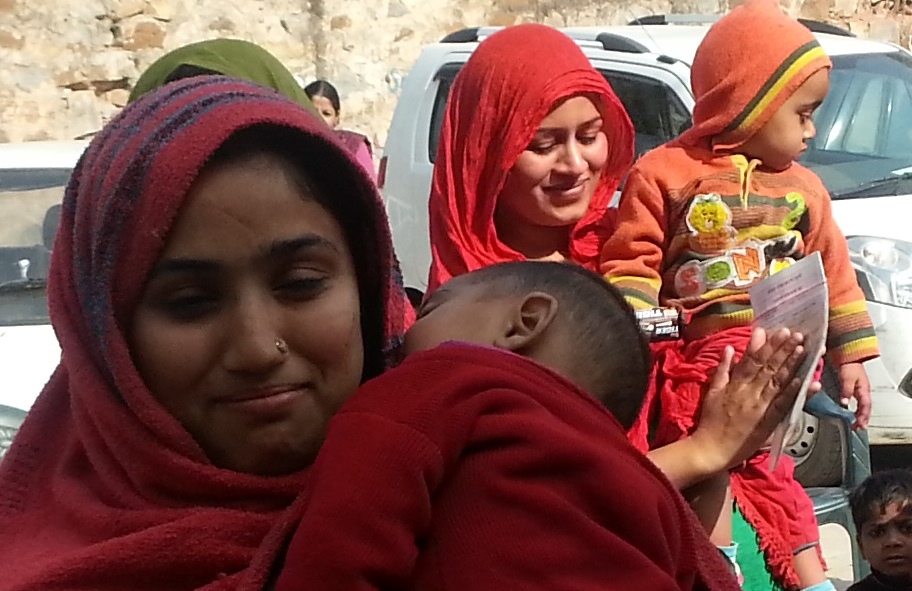
Major health problems affecting mothers and children in India are:
1. Malnutrition
2. Infection
3. Unregulated fertility
1. Malnutrition
o Malnutrition is widely prevalent in the developing countries
o Pregnant and lactating women and children are particularly vulnerable to malnutrition
o Malnutrition during pregnancy can result in complications like:
• Maternal depletion
• Anaemia
• Post-partum haemorrhage
• Toxaemia of pregnancy
• low birth weight in baby
o Critical periods of life when a child is most vulnerable to malnutrition:
1. Intra-uterine period
Children born with adequate birth weight have lower mortality even under poor environmental conditions
2. Weaning period
Severe malnutrition coincides with the usual age of weaning
o Malnourished children
• Are not only more susceptible to infections
• Severity of illness due to the infection is more among the malnourished children as compared to the well nourished
Hence improving, protection and promotion of the nutritional status, is an essential element of MCH care
Interventions for improving the nutrition of mothers and children are both
• Direct and
• Indirect
• Direct interventions for improving nutritional status are:
Supplementary feeding programs e.g. ICDS, mid-day meal
Food fortification e.g. Iodine, iron fortification of salt, Vitamins A and D fortification of vegetable oils
Iron and folic acid tablet distribution
Nutritional education
• Indirect interventions are those that do not involve direct provision of nutrition but eventually improve the nutritional status:
Control of infections through immunization
1. In general infections deplete nutrition, hence preventing them would improve nutritional status
2. Some infections like measles are known to specifically precipitate PEM, vitamin A deficiency etc. hence measles vaccination would indirectly preserve nutrition by preventing measles
Food hygiene
Provision for clean drinking water
Environmental sanitation
Education
o Education empowers with knowledge about nutrition
2. Infection
• Infections lead to increased morbidity and mortality among both, mother and the baby
The risk of infections is low in developed countries; but they continue to be a major problem in developing countries including India
• Infection during pregnancy can result in
IUGR and low birth weight
Congenital malformations in the foetus e.g. Rubella
abortions
puerperal sepsis
• Cytomegalovirus, herpes and toxoplasma infection are some of the infections seen among pregnant women
• In addition, 25 percent of pregnant women in rural areas have at least one bout of urinary tract infection
• Infection in the child:
1. The risk begins with delivery and then increases
2. Almost a third of the period of infancy may be afflicted by infections in developing countries
• Children are at risk for
1. diarrhoeal diseases,
2. respiratory tract infection and
3. skin infections
4. some regions of the country have increased risk of TB and malaria also
• Frequent infections may precipitate severe PEM and anaemia
• These conditions lead to traditions, taboos which may further aggravate the condition
o Therefore prevention and treatment of infections is a major activity of MCH care
• Infections can be controlled by
1. Immunization- children in developing countries need to be immunized against the major six infections covered under WHO’s EPI
TB
Diphtheria
Whooping cough
Tetanus
Measles and
Polio
2. Educating the mothers in management of infections like ORS, danger signs etc.
3. Improving nutritional status reduces both vulnerability and severity of infections
4. Provision of safe drinking water and sanitation
3. Unregulated Fertility (uncontrolled reproduction)
• Unregulated fertility adversely affects the health of both, the mother and the child
• Adverse effects on the mother:
1. Severe anaemia
2. Abortion
3. Antepartum haemorrhage
4. High maternal mortality, the risk increasing significantly after the 4th pregnancy
• Adverse effects on the child:
1. Low birth weight
2. Anaemia
3. High perinatal mortality, the risk increasing greatly after the 4th pregnancy
• Family planning services form an important part of MCH services as it has been shown to have a striking impact on the health of the mother and the child
• Moreover, convenient methods of family planning like new and safer Intrauterine contraceptive devices, oral contraceptive pills, long acting injectable medroxy progesterone acetate, female sterilisation and barrier methods are now available
• The services can be rendered by the peripheral health workers also
• In fact, some countries plan to include family life education at the school level itself
Reference:
Preventive Medicine in Obstetrics, Pediatrics and Geriatrics; Park’s Textbook of Preventive and Social Medicine, 23rd ed.
